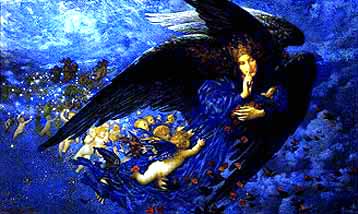|
|

|
|
|
Phenomenon
Sleep:
The Sixth Sense
by Scott Grady, CHt
Research & Education, A.R.E. Clinic
|
|
 Scott Grady
Scott Grady
|
|
Ages ago, somewhere, a philosopher developed the idea that mankind possessed a total of five senses.
A sense is a “knowing,” or a way of knowing, and the idea was that only through these five individual channels could we come to know the world.
These five senses were taste, smell, vision, touch, and hearing.
Other thinkers have at times added to this list, considering that a sixth sense might be a sense of balance, or perhaps a more esoteric ability such as intuition,
clairvoyance, or hearing or seeing in the spirit realm.
|

Edgar Cayce said that in sleep we contact a guardian entity — one that we’ve created with the thoughts we’ve
entertained over the eons.
|
The American psychic Edgar Cayce gave a short series of discourses on the subject of sleep, and in these readings he stated that sleep itself was the sixth sense. Perhaps he described sleep this way just to get the attention of his audience, for many people would be surprised to consider sleep as a sense. Most people would think that sleep is the opposite of a sense — that it is a state of complete insensibility, of unawareness.
Yet Cayce’s source of information did not see sleep as insensibility. What the source said was that when we prepare for sleep, it is as though we are preparing ourselves for a lesser form of death. For we abandon our physical consciousness, as in death, and focus upon a sensory channel that is like the most basic aspect of the sense of hearing.
The heart keeps pumping, all of our bodily systems and processes continue to function, the senses are alert, yet the mind’s awareness has shifted away from the exterior reality.
|
“Sleep,
says Cayce,
is a
faculty or sense
of the
soul itself.”
|
As the body enters this state of lesser death or unconsciousness, the sixth sense opens or expands and becomes capable of providing to the brain the knowledge that is normally conveyed by the other five senses. The sixth sense can now provide a sense of smell, feeling, hearing, sight and taste. The sixth sense also activates the lymph centers and the sympathetic or autonomic nervous system of the body. In this way, Cayce says, the sixth sense makes the whole self more acutely aware of — and responsive to — subtle vibrations, even though the brain and body are at rest.
When this has been achieved, the sixth sense contacts an entity, perhaps what would be termed a guardian spirit or angel — or perhaps it is more like a divine aspect of self. Cayce says it is “the accompanying entity that is ever on guard before the throne of the Creator itself.” [5754-1] As the sixth sense becomes attuned to this guard or guide, the sense creates effects within the brain and body that are in sympathy with the directives of this entity. The sympathetic effect works in the same way that a string on a musical instrument will vibrate in response to a tuning fork.
|
|
While this may sound highly unusual already, there’s more to tell. This guardian entity is like the subconscious mind, apparently, in that it may be trained, submerged, or left to its own initiative. When it finds itself in disagreement with the thoughts and deeds of the person it guards, the disharmony it experiences during sleep will affect the brain and body of the sleeper, through sympathetic vibration, and may consequently result in the creation of disease, depression, or irritability.
So, to sum it up: Cayce says that sleep is like a sixth sense, through which the power of a guardian spirit becomes activated in the sleeper’s mind and body. This spirit being — or aspect of self — has been built by the self through its experiences in the material and spiritual realms — over many lifetimes — and it leaves a definite, lasting impression in the mental, emotional, and physical aspects of the life of the sleeping individual.
Sleep — and the dreams that may come — can bring the sleeper illness or health, happiness or disillusionment. More can be learned about this subject in the chapter Day and Night, in A Search for God, Book II.
|
|

